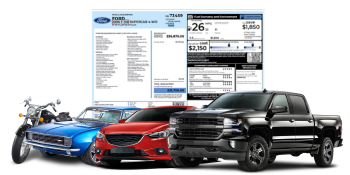When you buy a car, you want to know that you’re protected from unexpected repairs and costs. A car warranty is the promise that you’ll be covered if certain issues pop up.
Understanding the types of warranties, what they cover, and how they work is crucial. Without clear information, you may end up paying out-of-pocket for repairs you thought were covered. Luckily, understanding warranties can be simplified.
Let’s go through the basics of car warranties, the different types, and how to choose the one that’s right for you. And if you’re ever curious about a car’s warranty and specific details, our window sticker lookup by VIN tool is a great resource to help guide you.
RELATED: Car Ownership Costs: Breakdown and Calculations
The Purpose of a Car Warranty
A car warranty is like a safety net for car owners. It covers specific repairs or replacements if parts break down within a certain period. For most people, a car is one of their biggest investments, so knowing that it’s protected against costly repairs offers a lot of peace of mind.
Whether it’s the engine, electrical systems, or air conditioning, car warranties are designed to protect you from unexpected expenses.
Warranties ensure that car owners are not financially overwhelmed by these repairs. If a part covered by the warranty breaks down, you don’t have to worry about handling the full repair cost yourself. It’s the manufacturer or warranty provider’s job to step in, making the warranty a valuable part of car ownership.
Types of Car Warranties
Car warranties come in different types, each with specific coverage for parts and repairs. Let’s look at the most common ones.
Manufacturer Warranty
The manufacturer warranty is the most basic type, included with every new car purchase. It generally covers repairs for a set period, often three to five years, or up to a specific mileage. This type of warranty is typically divided into bumper-to-bumper coverage and powertrain coverage.
- Bumper-to-Bumper Warranty: A bumper-to-bumper warranty, as the name suggests, covers most parts of the car, from the front bumper to the back. It includes electrical systems, air conditioning, and most other components. However, it doesn’t cover wear-and-tear items like brakes and tires.
- Powertrain Warranty: The powertrain warranty focuses on the car’s core systems—the engine, transmission, and drivetrain. These are expensive to repair so powertrain warranties can save you significant costs. Powertrain warranties usually last longer than bumper-to-bumper warranties, often up to 10 years or 100,000 miles.
Extended Warranty
An extended warranty is an additional protection plan you can buy once the manufacturer’s warranty expires. Extended warranties can cover many of the same parts as the original warranty, but they may have limitations, so it’s essential to understand the details. If you’re buying a used car, this can be an excellent option to ensure you’re still covered for major repairs.
How Car Warranties Work
Car warranties are a way to protect yourself, but they have limits. Here’s a closer look at how warranties work, what they cover, and what they don’t.
Coverage Details
Car warranties usually list specific parts and systems they cover. Manufacturer warranties generally cover defects in materials or workmanship, meaning if a part is poorly made, it’ll be repaired or replaced. But they don’t cover damage caused by accidents or lack of maintenance.
Exclusions
No car warranty covers everything. Common exclusions include parts that wear down from normal use, like tires, brake pads, and fluids. Plus, issues caused by neglect—like not getting oil changes—won’t be covered either.
Claims Process
If something breaks, taking advantage of your warranty is typically straightforward. You bring your car to a dealership or authorized repair center, and they’ll handle the claim process. Usually, you’ll need to show proof of regular maintenance, so keep those records handy.
Benefits of Having a Car Warranty
There are several reasons why car warranties are helpful for vehicle owners.
- Peace of Mind: Knowing that expensive repairs are covered brings peace of mind. It’s a relief to know that if the engine fails or the transmission needs work, you won’t be paying for it entirely out of pocket.
- Financial Protection: Repairs can get expensive, especially for high-tech or hybrid vehicles. A car warranty provides financial security by reducing the risk of large repair bills. You can budget for regular maintenance without worrying about sudden, costly repairs.
- Resale Value: A car with a transferable warranty has a higher resale value. Buyers appreciate the added security of a warranty and may be willing to pay more for a car that’s still covered.
Potential Drawbacks of Car Warranties
While car warranties offer many advantages, there are also a few downsides.
- Deductibles and Fees
Some warranties come with deductibles, meaning you’ll still pay a small fee for each repair. These costs can add up if you have frequent issues. - Coverage Gaps
Not all parts are covered by warranties, so unexpected expenses may occur for components outside the warranty’s coverage. Understanding these gaps is crucial to avoid surprises. - High Costs for Extended Warranties
Extended warranties can be pricey, and if you rarely need repairs, you may not get your money’s worth. Weighing the cost against potential benefits is essential.
Choosing the Right Warranty
Finding the right warranty involves considering your vehicle’s age, usage, and personal needs.
For New Cars: If you’re buying a new car, the manufacturer’s warranty usually covers most issues for the first few years. Consider whether you need an extended warranty afterward based on how long you plan to keep the car.
For Used Cars: Check if the original warranty on your used car is still active. If it’s expired, an extended warranty can be beneficial, especially for older vehicles that are more prone to breakdowns.
For High-Tech Vehicles: High-tech or electric vehicles have specialized parts that can be costly to repair. Look for warranties that cover these unique components.
How Window Stickers Lookup Can Help You
When buying a car, it’s important to consider the warranty, knowing its coverage and duration and whether it’s expired for used cars. This will help you know which repair costs will be shouldered by the manufacturer or if you need to plan for any future repairs.
Our window sticker lookup tool provides detailed information about a car’s warranty, from the type to the duration and at what mileage it will no longer be valid.
This helps to make it easier to choose the right car based on the warranty. Whether you’re buying a new or used car, you can easily stay informed about the car’s warranty and details, aiding an informed buying decision.
Other information provided by a car window sticker includes fuel efficiency (MPG for City and Highway), MSRP (Manufacturer’s Suggested Retail Price), safety features, Mechanical features (interior and exterior ), and more.
Conclusion
Car warranties are a powerful tool for managing repair costs and protecting yourself from unexpected expenses. They cover key parts, like the powertrain and electrical systems, that could cost thousands to repair.
But warranties come with limits, so it’s important to know what they cover—and what they don’t. Selecting the right warranty depends on your car’s age, your driving habits, and how much coverage you want.
Whether you’re looking for peace of mind, financial security, or a boost to your car’s resale value, a good warranty can be a solid investment. By peeping into a car window sticker, you can get the information you need to choose a car with the best warranty.
Frequently Asked Questions
What does a typical car warranty cover?
A standard car warranty covers repairs to key components, such as the engine, transmission, and electrical systems. It doesn’t include wear-and-tear items like tires or damage from accidents.
How long do car warranties last?
Most manufacturer warranties last three to five years or up to a certain mileage, often 36,000 to 60,000 miles. Depending on the provider, extended warranties can extend coverage up to 10 years or 100,000 miles.
Is it worth getting an extended warranty for my car?
An extended warranty can be worth it if you want additional coverage after the manufacturer’s warranty expires, especially for high-mileage or older vehicles more prone to breakdowns.









